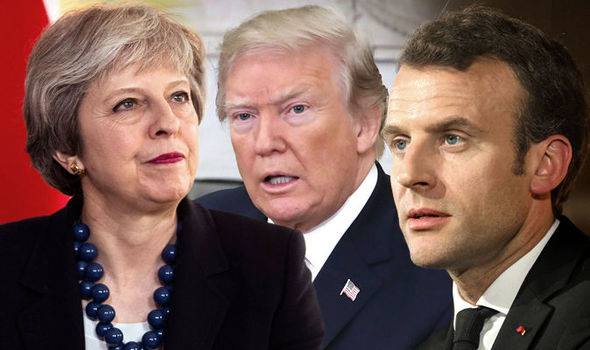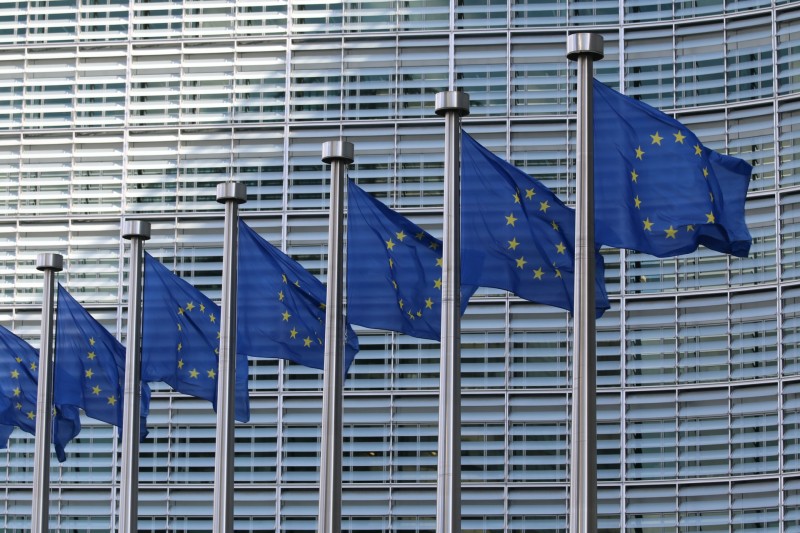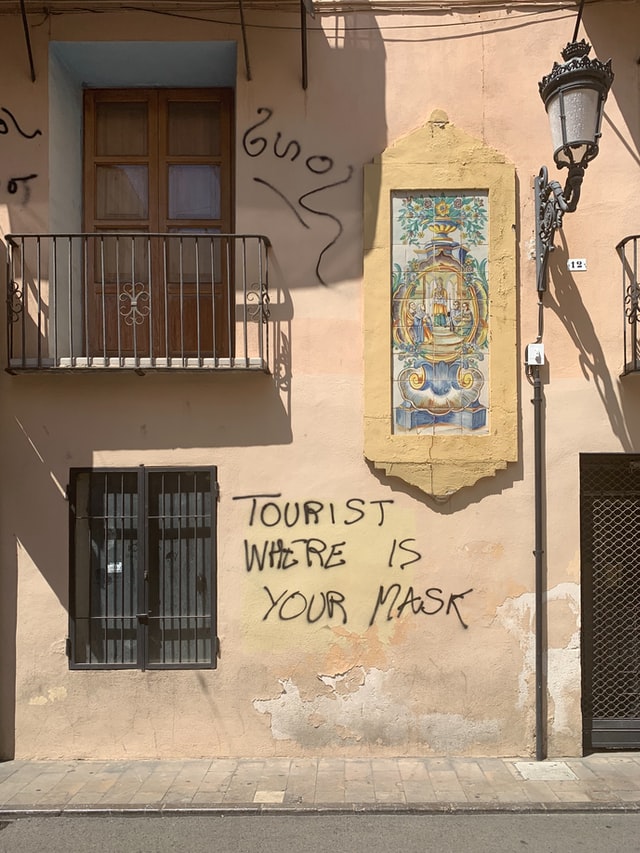Syria – the Atlantic triptych & the emergency of an EU action
On the morning of last Saturday, April 14th, the world and Europe woke up with the news of the attack by the American, French and British military forces against the alleged possessions and plants of the Assad regime in Syria suspected of producing chemical weapons. History repeating itself. The Atlantic triptych, a powerful and long-standing fortress of the Euro-Atlantic sphere, has returned to be assertive in the Middle East and the Mediterranean, seven years after the intervention in Libya and the advent of the Arab springs.
President Juncker did not press charges against the British and French decision to take a national military action against the Syrian chemical plants, without prior consultation at EU level.
President Trump undertook an almost unilateral attack – as it lacked congressional approval – in collaboration with its European and historical allies. The US decision moves away from its predecessor who did not intervene militarily in Syria as a result of the legacy of Obama’s worst mistake in Libya (2011), despite the “red line” had already been crossed (the use of chemical weapons). Trump’s interventionism moves away from the apparent form of US isolationism which seemed to mark the new American foreign policy of the Trump Administration. The US president is far from not being directly involved in the international chess board, including the Middle East region. Indeed, on 7 December 2017, Trump decided to transfer the American embassy to Jerusalem, with the intention of officially recognizing the latter as the historical and legitimate capital of Israel. The United States keeps the outside world from noticing it, within that Liberal Leviathan and international order progressively established and built by its own history and on which the whole American model and legitimacy is based. Exactly one day before the intervention in Syria, Trump declared: “America was built by men and women, but never give up and never stop believing in the great American Dream”. A historical and identity pillar that cyclically returns. And again: “American Spirit is back. […] It really is back. […] We are the ones who are shaping our own destiny.” The American exceptionalism that brought Washington to the Moon, which built the Panama Canal – a spiritual force which made the United States a global superpower based on a widespread internationalism. Exceptionalism becoming internationalism and constantly leading the US to intervene globally, albeit differently in terms of power and policy instruments.
Theresa May declared that there were no alternatives to the military intervention and that it was crucial to launch a military strike that would also send a message to Russian provocations. An attack which seems to be linked to recent events and acrimonies occurred in the relations between London and Moscow, but logically there might be more to it. The Atlanticist attitude seems a result of the British desire to assert a Global Britain, to exhume and reshape the glorious past of the Empire, the Commonwealth and the image of a British superpower making its way in the world, as well as asserting its power in the Mediterranean as the main maritime power (despite the undisputed presence of the US Sixth Fleet) – a record destroyed since the end of the Age of Empire (’56), after the Suez Crisis, and then with the Six Days War in 1967. This UK, perhaps logically, but also confidently, confirms its loyal and faithful attachment to transatlantic cooperation, especially in the light of the specter of Brexit and the need to carry on a hard Brexit to face a multitude of challenges ahead, but especially how to compete with an even growing globalized, interdependent and multipolar international order.
Furthermore, Emmanuel Macron, the French President, the most powerful and charismatic of current European leaders. Hopes and expectations are consumed on him. Macron won against Le Pen, a victory with few national connotations, rather a victory for Europe. Macron carries the weight and the responsibility of campaigning in the name of the EU values, contributing to relaunching a strong and forward-looking European project in a crucial turning point.
Europe is in a current standstill. The long waiting period for the formation of a German government has delayed the work of European reforms. Further, the outcome of the Italian elections has created a stalemate, with an Italy increasingly dominated by a profound populism and rooted Euroscepticism. The Italian incognita, a French key-partner, further complicates the work for the construction of a renovated Euro-Mediterranean vision, all but failed after Obama’s military intervention in Libya together with France and UK and the outbreak of the Syrian crisis in 2012. Macron’s France should be on its own to take the reins of a fragile and uncertain Europe internally, but being aware of the need to carry out fundamental reforms not only to complete the continental integration, but also to strengthen the European external action, masterfully orchestrated by the High Representative Federica Mogherini.
The US-led attack in Syria, supported by France and UK, might question French intentions and identity. How truly is Macron Europeanist? How much can this leading France offer real added value to the building of a EU which aims to face the XXI century with all its ambiguities and uncertainties? How much does the French leadership really aim at bridging the gap between the intergovernmental and the European method to strengthen the spiritual and material evolution of the integration process?
France has often been a “game shifter” in this idealistic and political struggle throughout the history of European integration process. For means of exemplification, we could mention three cases.
Firstly, Charles De Gaulle was the first European leader who fought to impose the intergovernmental method into the European institutional structure. De Gaulle was a supporter of a collaborative Europe, a “Europe of homelands” and the integration process, if it would guarantee French security, centrality and prosperity.
Secondly, few after the launch of the Venice Declaration (1980), President Mitterrand attempted directly and actively to improve and consolidate its bilateral relations with Egypt and Israel, embracing the foreign policy approach pursued by the United States. As occurred with De Gaulle, once again French foreign policy aimed at re-establishing a dominant and influential French role in the Middle East, to the detriment of a European collective vision.
Finally, when French President Nicolas Sarkozy proposed the Union for the Mediterranean (UFM) in 2008, Sarkozy wanted to create a composition of Mediterranean states by way of purely regional policy, at the expense of Europe’s external dimension. Sarkozy reiterated that the Mediterranean was discarded, consequently calling for the need to increase its potential by avoiding its dilution at European level. This reason was also among those why he presented the project within a “Latin” framework. Nevertheless, Sarkozy’s real goal was to enhance French foreign policy and issued a proposal to include only those countries really interested in the initiative.
When the **Arab world **has been shaken by the desire for freedom, by the demand of civil society for democracy and respect for fundamental rights, Europe proved unable to take the initiative and to assume a balancing role that its history and geography would assert. The European response appeared to be slow, weak, divided and incoherent. Thus, reactions declined and differentiated, according to the interests at stake and the strategic position of the country in question. As such, national selfishness prevails, as demonstrated by the striking contrast between NATO’s intervention in Libya and Europe’s wary reaction to the bloody repression of the Syrian people at the hands of the Assad regime.
The **Libyan civil wars **(2011 and 2014-present) have shown that misunderstandings and hesitations delayed Europe’s awareness of events in their “near abroad”. This attitude ended up favoring national actors, such as France. French President Sarkozy took military action in his desire to get back to play a leadership role in the Mediterranean, regarding oil concessions, for instance. As a result, Europe was urged to deal with the Libyan crisis, forced to support NATO’s military commitment against the Gaddafi’s regime.
The outbreak of the Arab Spring coincided with the EU’s implementation of its Lisbon Treaty and a new EU foreign policy structural pillar. In theory, the Lisbon Treaty was designed to facilitate a more coherent, efficient, and influential common foreign policy strategy. Historical revelations demonstrate the limits of European foreign policy, stressing how the facilities traced by the Lisbon Treaty – through the institution of the High Representative of the Union for Foreign Affairs and Security Policy – are not synonymous with a common foreign policy. On the contrary, sometimes European foreign policy has moved along the traditional paths marked by interests of the main European states, which aspire to play a leading role with a neo-colonial element, as is the case with French and British actions during the Libyan crisis.
The attack in Syria provides proof of history repeating itself at the expense of the EU external action, taking us to back to reflect on the retrospective destabilizing effects of the Libyan “humanitarian war” and a country like Syria which abandoned the Union for the Mediterranean and fell under Russia’s military presence, willing to assert its regional power. In the face with this changing and interdependent nature of the Mediterranean region, the future of the European external action seems dependent on the EU’s ability to assert its political, economic and cultural power and to speak with a single voice in foreign policy. Now more than ever in Syria, EU member states should work together for a progressive development of PeSCo and to provide Europe with new tools to counteract further national intemperance and selfishness.
By Leonardo Brambilla




